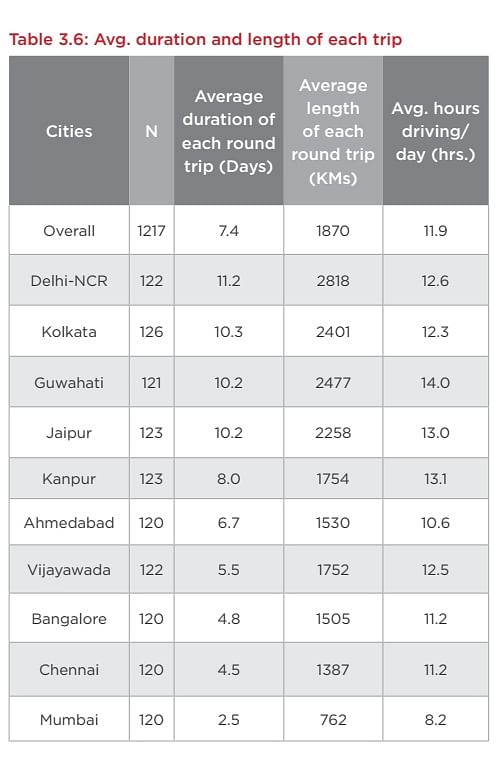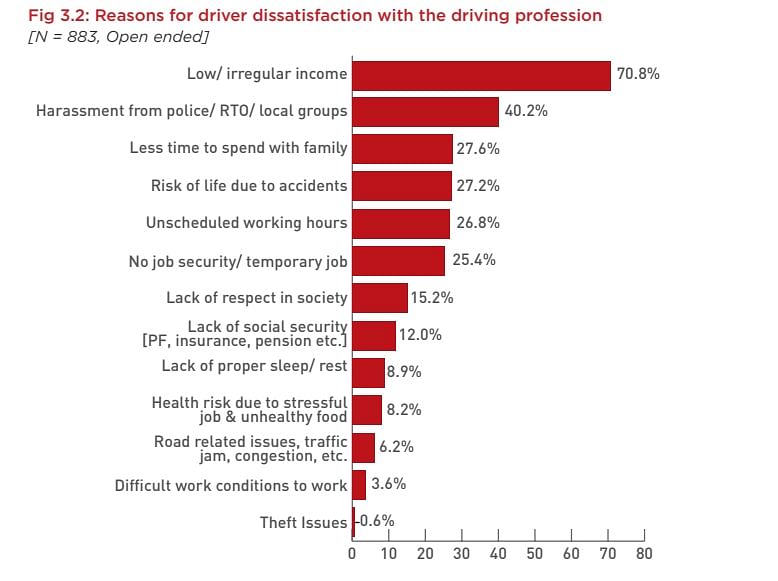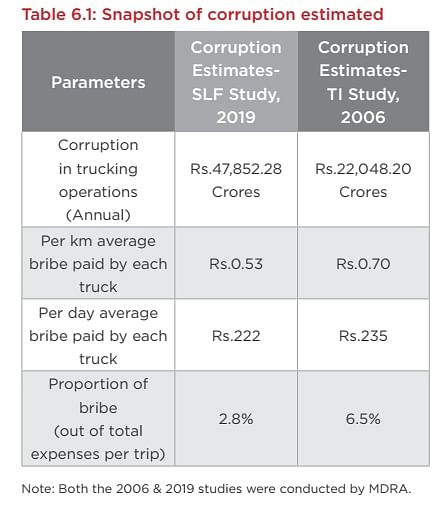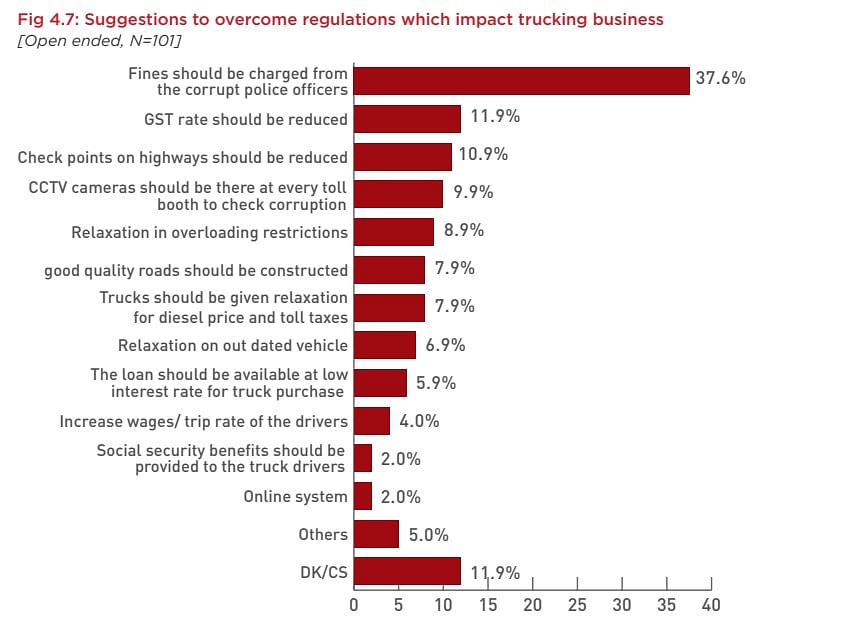Most truck drivers in India are sleep deprived, compromise road safety: SaveLife’s hard-hitting report
The ‘Status of Truck Drivers in India’ study, which used quantitative research to survey 1,217 truck drivers and 101 fleet owners (1,318 total) in 10 cities across India, is an incisive, data-filled analysis of just how bad the working conditions are for truck drivers in India.
India tops the world in road crash deaths. In 2018, road accidents in India claimed 415 lives, injured 1,286 people each day in 2018 – that’s like a plane going down every single day of the year but that would make the headlines while these deadly statistics barely do. The situation is really alarming because in 2018, road crashes claimed the lives of 151,417 lives (+2.37%) and injured 469,418 (-0.33%) individuals. Of this, over 15,000 road crash victims have been truck and lorry drivers.
In terms of vehicle category, trucks and lorries are involved in over 57,000 crashes. Other additional factors like overloading and load protrusion increase the exposure to risk for other road users. Despite being a serious traffic offence, overloading of trucks has contributed to 12 percent of total road crash deaths.
Out of this, over 15,000 road crash victims have been truck and lorry drivers. In terms of vehicle category, trucks and lorries are involved in over 57,000 crashes. Other additional factors like overloading and load protrusion increase the exposure to risk for other road users. Despite being a serious traffic offence, overloading of trucks has contributed to 12% of total road crash deaths.
SaveLIFE Foundation (SLF), an NGO dedicated to road safety, today released a nation-wide, multi-city research report on the working conditions and safety status of truck drivers along with other factors impacting road safety of truck drivers and other road users in India.
The study, conducted in partnership with Mahindra & Mahindra, covered over 1,200 truck drivers and over 100 fleet owners as respondents and was conducted across 10 transportation hubs in India – Delhi-NCR, Mumbai, Chennai, Kolkata, Bangalore, Jaipur, Ahmedabad, Guwahati, Kanpur, and Vijayawada. 
According to the findings of the report, on average, respondents drive for about 12 hours a day, with almost 50 percent of them driving continuously, even if they feel fatigued or sleepy. Overall, one in five respondents admitted to taking some kind of drugs during trips. The proportion of such respondents was highest in Kolkata followed by Kanpur and Delhi NCR. In all three cities, over half of the respondents confirmed driving under the influence of drugs.
The study revealed that 53% of the drivers were dissatisfied with their profession due to low and irregular income, harassment from officials and unscheduled working hours. Health problems like severe backaches, joint/muscle/neck pain and stomach problems and lack of social security also contributed to their dissatisfaction.
 Piyush Tewari, CEO, SaveLIFE Foundation said, “If we analyse the road crash statistics specific to the trucking sector, we see a big dichotomy. Even though trucks and lorries have third highest share of crashes in terms of impacting vehicles killing over 23,000 people; amongst road-user categories, trucks/lories again make up third-highest share of deaths killing over 15,000 drivers every year. Through this study, we aim to understand the reason behind unsafe driving practices by truck drivers as well as structural and other reasons which push them to compromise their safety as well as safety of other road users.”
Piyush Tewari, CEO, SaveLIFE Foundation said, “If we analyse the road crash statistics specific to the trucking sector, we see a big dichotomy. Even though trucks and lorries have third highest share of crashes in terms of impacting vehicles killing over 23,000 people; amongst road-user categories, trucks/lories again make up third-highest share of deaths killing over 15,000 drivers every year. Through this study, we aim to understand the reason behind unsafe driving practices by truck drivers as well as structural and other reasons which push them to compromise their safety as well as safety of other road users.”
Commenting on the launch of the report, Vijay Nair, VP - Admin & CSR, Mahindra & Mahindra, said, “While there have been many initiatives to raise awareness and safety of truck drivers in India, this study points at important gaps that need to be addressed to improve the status of truck drivers in India. Truck drivers are the lifeline of road freight transport in India and it’s important to address the challenges faced by them. Through this study and our partnership with SaveLIFE Foundation, we aim to bring forth strong evidence to bring attention to this issue and we are optimistic of this making an impact”.
While the majority of truck drivers reported feeling unsafe on roads, very few of them felt that they themselves engage in unsafe driving or unsafe practices. In order to get away with the situation where they are caught flouting rules, respondents admitted to paying bribes. About 49% of the respondents who were caught with protruding load admitted to paying a bribe to get out of the situation.
General (Dr) VK Singh (Retd), Minister of State, Road, Transport and Highway, said that “The report highlights some very pertinent issues in the trucking industry that lead to unsafe roads for both drivers as well as road users. The Central Government is taking a number of initiatives to improve the condition of road safety in the country. The new Motor Vehicle Act increases brings in reforms such as improvements in driver licensing system, recall of faulty vehicles and electronic monitoring & enforcement to reduce corruption. I would strongly urge all the states and solicit their cooperation in implementing the amended act.”
“Since the freight through trucks is going to grow in future, we need to ensure safer roads for all. We’re also looking at creation of training schools – mainly in rural and backward areas to educate the fleet owners and truck drivers on road safety,” he added.

The findings of the study highlighted that corruption clubbed with the poor condition of road infrastructure makes truck driving a challenging profession. The study estimated that currently, Rs 47,852.28 crore (6.7 billion US$) per year is the estimated bribe amount in the trucking operations.
In Delhi, about 58% of the respondents reported a deterioration in their quality of life in the last 10 years and 73% of the respondents in Delhi stated that the workings conditions are bad. When asked to report the key health-issues faced during trips, almost 96% of them reported back aches while 64% reported headaches/dizziness. More than half of the respondents in Delhi admitted to consuming drugs while on a trip. Almost 84% of the respondents in Delhi-NCR admitted to paying bribe to traffic/highway police as compared to nearly 67% of the respondents nationwide.
Truck drivers form the backbone of the logistics sector. They are the most important stakeholder in ensuring smooth transportation of goods over long distances, yet remain vulnerable due to the fragmented and informal nature of the trucking industry. This study reveals that more than half of the respondent truck drivers are dissatisfied with their profession. Here’s why:
FINDINGS OF THE STUDY
- Overall, 53% of respondents are dissatisfied with their profession.
- Over 9 out of 10 respondents (93%) confirmed that other than salary/wages, they do not get any social security benefits (such as provident fund, pension, health insurance, life insurance, gratuity, etc.)
- About 84% of the respondents said they will not recommend trucking to their family members or relatives
- 53% of the respondents said that they earn between INR 10,000 to INR 20,000 per month.
- More than 93% of respondents work as employees. Only about 1 in 15 (6%) of the respondents drive self-owned trucks.
- More than 6 out of 10 (62%) respondents felt unsafe while driving on the roads.
- On an average, respondents drive for nearly 12 hours in a day and cover a distance of 417km daily.
- At present, Rs 47,852.28 crore (approximately 6.7 billion US$) per year is the estimated bribe amount in the trucking operations. This is higher than the reported figure of Rs. 22,048.20 crore in 2006-07
- Almost 50% of the respondents said they drive vehicles even if they are feeling fatigued or sleepy.
- 9 out of 10 respondents confessed they did not undergo any formal training before getting a driving license.
- More than 1 in 5 (22%) respondents said they take some kind of drugs during trips.
RECOMMENDATIONS TO GOVERNMENT, TRANSPORT AUTHORITIES AND FLEET OWNERS
According to SaveLife Foundation, this comprehensive study was conducted to better understand the status of truck drivers in the country on various parameters like quality of life, health, safety and security on the road, economic stability, corruption and harassment faced by authorities.

Apart from the quantitative survey among truck drivers and fleet owners, opinions of the stakeholders were documented through qualitative interviews in the form of in-depth discussions and a focus group discussion. Twenty-one in-depth interviews were conducted with fleet owners and transport associations while an FGD was conducted in Sanjay Gandhi Transport Nagar, Delhi. Based on discussions with truck drivers, association members and fleet owners, suggestions are being offered for improving truck drivers’ quality of life. These suggestions are segregated at government level, authorities level, and transport associations and fleet owners’ level.
At Government level
1. Truck drivers should be grouped under a formal remuneration structure along with mandatory social security benefits including insurance, provident fund, etc. 9 out of 10 truck drivers’ monthly salary is only up to Rs. 20,000 and almost 93% of the truck drivers do not get any social security benefit.
2. The norms with respect to working hours of truck drivers should be implemented as per the Motor Transport Workers Act, 1961. Truck drivers generally work for long hours, and in some situations, where the consignment has to reach at distant locations, they have to drive for days as well. Long working hours not only hamper their health and physique but make them vulnerable to road crashes.
3. An audit of transporters should be done on a regular basis to ensure that they are following guidelines as per the Motor Transport Workers Act, 1961.
4. The Government and related authorities should take care of the roadside facilities i.e. availability of good quality food, toilets/ bathrooms, rest places, secure parking spaces etc. Fatigue is a major concern for both the health and safety of truck drivers. Studies have shown that driver fatigue is a major cause for road crashes. The lack of proper rest also leads to a number of ailments for truck drivers. Thus, well designed rest stops can improve the health of truck drivers as well as improve road safety. Clean and hygienic truck terminals, resting rooms or ‘dharmshalas’ should be built in collaboration with local community groups, NGOs or private firms under their CSR initiatives.
5. There are multiple taxes which are being taken from truckers in the form of green tax, toll tax, road tax, parking tax etc. A portion of such taxes should be used to make a fund for introducing welfare schemes for truck drivers. Such a fund could be used to provide social security benefits, better roadside amenities, improving quality of life of truckers, etc.
6. As per the survey findings, the facilities at many existing transport terminals are not up to the mark. The Government along with respective authorities needs to provide better facilities at transport terminals, where truck drivers could take rest and park their vehicles safely.
7. Establish truck driving training schools especially in key cities so that new drivers are well trained, and they are aware of their rights and responsibilities.
8. The Government should implement strict enforcement of laws related to corruption, bribery and extortion. Strict vigilance and regular patrolling on highways should be made mandatory for enforcement of laws. 9. Create awareness and sensitize department officials against corruption and illegal practices.
At authorities' level
1. The process of documentation (i.e. new/ renewal of driving license and permit, fitness certificate, registration of vehicle etc.) should be made online.
2. In order to monitor enforcement officials’ behaviour and corrupt practices on highways, each official should wear a camera while checking vehicles on checkpoints or issuing challans.
3. At various checkpoints and toll gates, CCTV cameras should be installed to keep an eye on corrupt officials.
4. Corruption by local groups should be checked. Regular patrolling on highways should be ensured to reduce corruption and theft of goods from trucks.
5. Authorities should provide a dedicated helpline number for truck drivers where corruption or bribery-related complaints could be registered. Such a helpline number should be displayed prominently on highways.
6. The relevant provisions of the Motor Vehicles (Amendment) Act 2019, along with important traffic rules, should be displayed on highways, checkpoints, toll plazas etc. to inform and educate truck drivers and fleet owners about these provisions, and to inculcate safe driving behaviour.
At transport associations' and fleet owners' level
1. Associations should conduct regular workshops and programs to educate truck drivers and fleet owners about safe driving behaviour, traffic rules and regulations, maintaining work-life balance, etc.
2. Health care awareness campaigns should be undertaken at transport hubs or workplace of large truck operators to educate drivers about possible health risks associated with driving profession.
3. Conduct medical camps along with other stakeholders for providing better and easy access to health care services to truck drivers.
4. Transport associations along with Government and corporates should help in providing better amenities (healthy food, rest places, secure parking, washroom facilities, etc.) for truck drivers on highways.
Infographics: SaveLife Foundation
Photographs: Subhash Simhudu
RELATED ARTICLES
Cosmo First diversifies into paint protection film and ceramic coatings
The Aurangabad, Maharashtra-based packaging materials supplier is leveraging its competencies in plastic films and speci...
JSW MG Motor India confident of selling 1,000 M9 electric MPVs in first year
The 5.2-metre-long, seven-seater luxury electric MPV, which will be locally assembled at the Halol plant in Gujarat, wil...
Modern Automotives targets 25% CAGR in forged components by FY2031, diversifies into e-3Ws
The Tier-1 component supplier of forged components such as connecting rods, crankshafts, tie-rods, and fork bridges to l...






 By Autocar Professional Bureau
By Autocar Professional Bureau
 28 Feb 2020
28 Feb 2020
 48604 Views
48604 Views






































